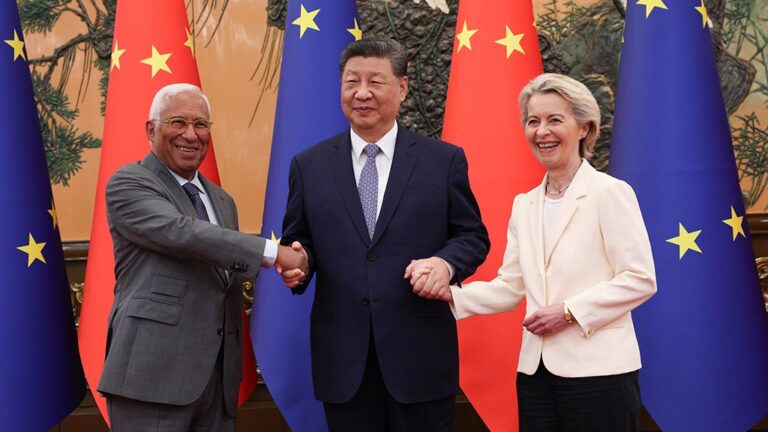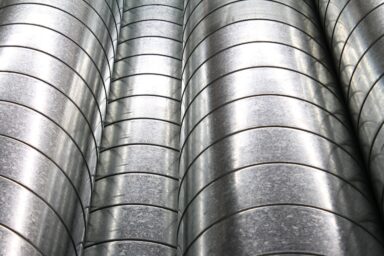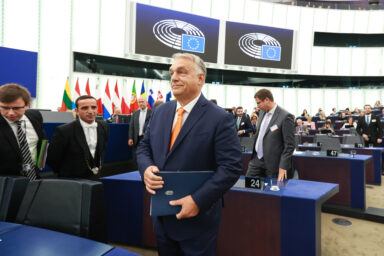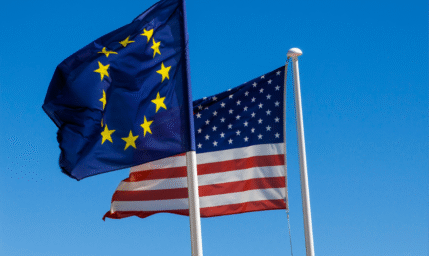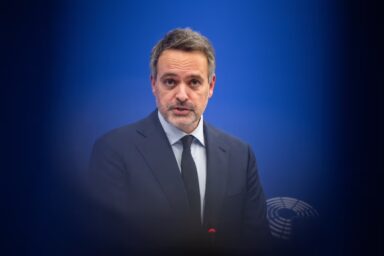Just days ago, a high-level European delegation, led by European Council President António Costa, European Commission President Ursula von der Leyen, and accompanied by EU foreign policy chief Kaja Kallas, travelled to Beijing for the long-anticipated EU-China summit. The lead-up to the meeting was tense and the results? Mixed. The picture has not improved much since.
While the EU had been adamant about addressing what it sees as an imbalanced trade relationship with Beijing, Chinese President Xi Jinping’s attendance remained uncertain until the last moment (he met the European leaders at a separate session), and the agenda was reportedly shortened at China’s request.
The outcomes were, in line with expectations of various MEPs, modest. The only concrete result was a joint statement on climate change, in which both sides committed to translating their targets into “tangible outcomes.”
Still, Mr Costa struck a somewhat optimistic note: “Fair and mutually beneficial trade relations are possible and should be our joint aim,” he said in a press conference following the summit.
You might be interested
For his part, Mr Xi also took on a seemingly mild tone: “There are no fundamental conflicts of interest or geopolitical contradictions,” he said, urging the EU to “properly handle differences and frictions” and keep markets open.
A critically unbalanced relationship
Trade and economic ties dominated the agenda. Tensions between Brussels and Beijing have been rising, with the European Commission describing the EU-China trade relationship as “critically unbalanced.” Ms von der Leyen has pointed to what she calls systemic discrimination against European companies in China. “Public procurement is skewed. Access to sectors like medical devices is restricted. And overcapacity is being dumped onto global markets: first solar panels, now EVs.”
Rebalancing the economic relationship by demanding reciprocity and transparency was a key priority for the EU. As Mr Costa emphasized: “The EU and China together account for over a third of global GDP. A fair balance in our economic relations is essential.”
Longstanding concerns were discussed in Beijing: Chinese industrial overcapacity, market access restrictions, especially in meat, cosmetics, and pharmaceuticals, and what the Commission calls the “misuse” of anti-dumping measures against EU exports like brandy, pork, and dairy.
Beijing, in turn, accuses the EU of increasing “protectionism”. It has long urged Brussels to lift measures such as the provisional duties of up to 38.1 per cent on Chinese EV imports imposed last year.
Limited leverage?
Many MEPs had warned beforehand that strong words by the EU wouldn’t be enough to see real improvement in EU-China relations. MEP Bart Groothuis (Renew/NDL) previously highlighted the “strategic chokehold” China has over Europe. In April, China banned exports of six rare earth elements, shaking Europe’s industrial sector. Mr Groothuis urged the delegation to use every form of leverage it has during the summit, not just diplomatic language.
Yet, it seems like the EU did not go far beyond condemnations and some threats. “The EU remains ready to continue engaging in constructive dialogue to find negotiated solutions,” the Commission said in its post-summit readout. “But as long as this is not the case, the EU will take proportionate, legally compliant action to protect its rightful interests.”
Indeed, not all leverage lies with China. Bonnie Glaser, managing director at the German Marshall Fund noted in an interview with Carnegie Endowment that while the EU depends on Chinese raw materials, China also needs Europe’s markets, particularly for its surplus of electric vehicles, batteries, and solar panels. This interdependence, she argues, may actually strengthen the EU’s position.
Fair and mutually beneficial trade relations are possible and should be our joint aim. – European Council President António Costa
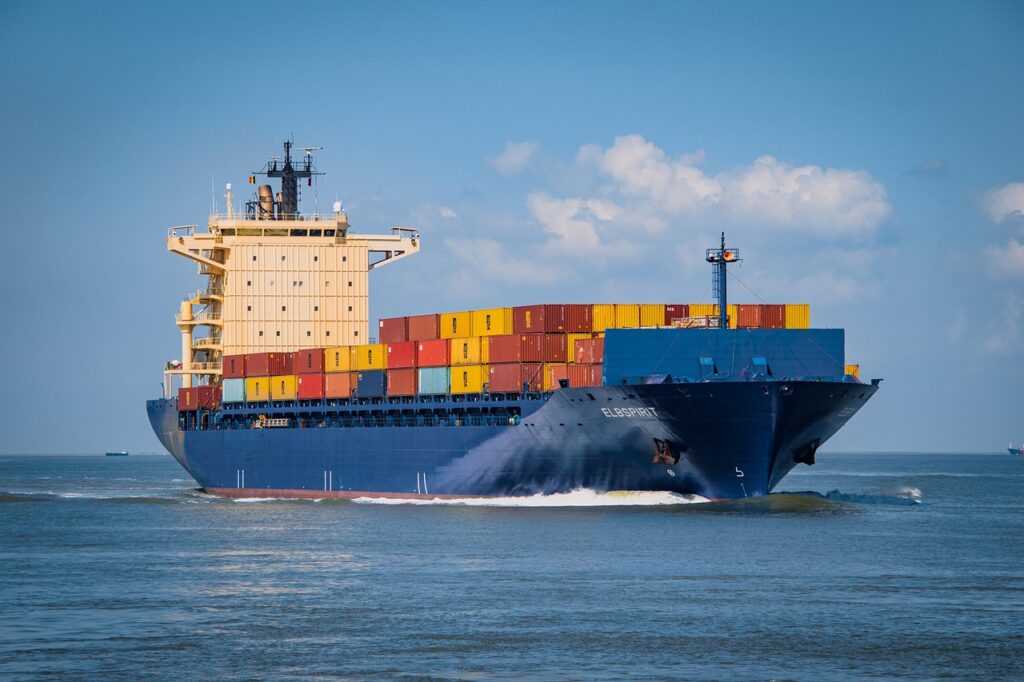
A rare earth concession?
There was, nonetheless, one modest breakthrough: China agreed to establish an “upgraded export supply mechanism” for rare earth elements, designed to address future export bottlenecks. Ms von der Leyen welcomed the step as essential for securing critical raw materials, though the mechanism remains vague for now. No details have been disclosed about what goods it will cover or whether the EU made any concessions in return.
Notably, in the weeks leading up to the summit, China had already eased pressure: exports of rare earth magnets to the EU surged 245 per cent in June compared to May, reaching 1,364 metric tons (though still 35 per cent below last year’s levels). Brussels continues to push China’s Ministry of Commerce (MOFCOM) to issue export licenses without delay. But Beijing is likely to keep the new mechanism as a bargaining chip, especially in response to EU export controls on Chinese firms.
Is the enemy of my enemy my friend? Not quite
Some had speculated earlier this year that Europe’s difficult relationship with the US might bring it closer to China. That hasn’t happened. In fact, Brussels’ alignment with Washington on supply chains, export controls, and overcapacity points to growing frustration with Beijing.
This geopolitical triangle is having ripple effects. The EU recently struck a deal with the US to halve threatened tariffs on European exports. But the deal also contains geopolitical components, including coordination on Chinese industrial overcapacity.
Trade Commissioner Maroš Šefčovič recently stated that the list of problems with China keeps growing: “The US has the same issues with China in many areas. So it goes without saying that we should work together with our allies.”
President Von der Leyen echoed this in reference to the US deal: “On steel and aluminum, the European Union and the US face the common external challenge of global overcapacity. When Washington and Brussels work together as partners, the benefits are tangible on both sides”, she said.
The European Central Bank has also weighed in, warning that US-China tensions could directly affect the euro area. If China redirects exports from the US to Europe, deepening the trade imbalance, and could reduce euro area inflation by as much as 0.15 percentage points.
In this atmosphere of strategic mistrust, the mood is clearly tense – if not frosty. – MEP Engin Eroglu, (chair of the European Parliament’s China delegation
Another geopolitical triangle looming over the summit was that of the EU, China, and Russia. The EU has long been concerned about China’s support for Russia, particularly as Putin’s war in Ukraine drags on. Until recently, China seemed more or less unfazed by EU sanctions targeting entities linked to Russia. But the EU’s 18th sanctions package includes two Chinese banks, Suifenhe Rural Commercial Bank and Heihe Rural Commercial Bank. This drew a strong rebuke from Beijing, with MOFCOM vowing to take “necessary steps,” hinting at retaliation through export controls.
Brussels unimpressed
In the end, Brussels was not impressed with what von der Leyen and Costa brought home.
“Europe must stop tiptoeing around China’s increasingly aggressive economic behavior,” said MEP Hannah Neumann (Greens-EFA/DEU). “Beijing distorts global markets through unfair subsidies, dumping, and coercive tactics. If we are serious about defending European industry and workers, we must push back.”
MEP Engin Eroglu (Renew/DEU), chair of the European Parliament’s China delegation, even said that trust between the EU and China has hit a new low: “In this atmosphere of strategic mistrust, the mood is clearly tense — if not frosty.”
